 MyDogBreeds
MyDogBreeds Miniature Siberian Husky is originated from United States but Irish Wolfhound is originated from Ireland. Miniature Siberian Husky may grow 47 cm / 18 inches shorter than Irish Wolfhound. Miniature Siberian Husky may weigh 43 kg / 94 pounds lesser than Irish Wolfhound. Miniature Siberian Husky may live 4 years more than Irish Wolfhound. Miniature Siberian Husky may have more litter size than Irish Wolfhound. Both Miniature Siberian Husky and Irish Wolfhound requires Moderate maintenance.
Miniature Siberian Husky is originated from United States but Irish Wolfhound is originated from Ireland. Miniature Siberian Husky may grow 47 cm / 18 inches shorter than Irish Wolfhound. Miniature Siberian Husky may weigh 43 kg / 94 pounds lesser than Irish Wolfhound. Miniature Siberian Husky may live 4 years more than Irish Wolfhound. Miniature Siberian Husky may have more litter size than Irish Wolfhound. Both Miniature Siberian Husky and Irish Wolfhound requires Moderate maintenance.
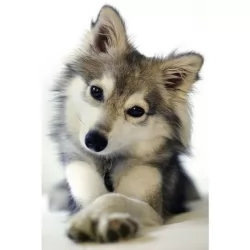 Miniature Siberian Huskies – also known as mini huskies – are your regular Siberian husky bred to be that much smaller than what the breed standard dictates.
Miniature Siberian Huskies – also known as mini huskies – are your regular Siberian husky bred to be that much smaller than what the breed standard dictates.
They’re sought after by those who love the regular sized Siberian Husky but who find the larger dog too large and boisterous. They come complete with the looks and the temperament of the Siberian Husky but they are smaller.
The origins of these gorgeous Mini huskies is conflicting though as some believe they originated in the USA. The name of Bree Normandin is bandied about when talking of the breed’s origin while other refer to Linda S. Spurlin from Alaska. She became interested in them when her full-sized husky became pregnant by a small dog.
Spurlin used Siberian and Alaskan Huskies as well as small Schipperkes and American Eskimo Dogs to bring about the mini version. They’ve got the same pedigree as the Siberian Husky, but it has been selectively bred for its smaller size, also coming from the Spitz family of dogs.
The Miniature Husky is genetically the same as the larger Siberian Husky and the AKC doesn’t recognize it as a separate breed, but sees it as a different size variation of the working-group Siberian Husky.
 It is believed that the Irish Wolfhound is an ancient breed and that it was brought to Ireland as early as 7000 BC.
It is believed that the Irish Wolfhound is an ancient breed and that it was brought to Ireland as early as 7000 BC.
These dogs were bred as hunting dogs as well as guard dogs. There was a time when these huge canines were only allowed to be owned by the nobility. The breed died out somewhat, but Scotsman Captain George Augustus Graham made efforts to restore the breed’s numbers.
Captain Graham devoted his life to making sure the Irish Wolfhound’s numbers were built up, and the breeding program included Great Danes, Borzois, English Mastiffs and Scottish Deerhounds.
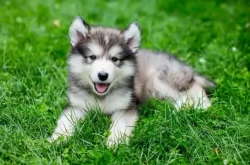 Known also as the Alaskan Klee Klai,the Miniature Siberian Husky stands at 33-39cm in height and weighs between 8 - 11kg.
Known also as the Alaskan Klee Klai,the Miniature Siberian Husky stands at 33-39cm in height and weighs between 8 - 11kg.
These mini huskies are like the larger huskies and can also come in a range of color variations such as grey and white, black and white or red and white for instance. In typical Spitz dog fashion they have the erect ears and long bushy tail. A striking feature of these dogs is the beautiful eyes – they can be brown but also a mesmerising blue.
This Miniature Siberian Husky is an intelligent dog and you’re not going to have any trouble with him teaching him some basic commands such as sit, lie-down and stay.
You need to know that these dogs aren’t going to be content lying around all day and that they want to be kept busy almost around the clock. They have always been working dogs so he will need plenty of mental – and physical exercise to keep him content. A bored, frustrated Mini Husky will just develop problem behavior through no fault of his own. People who buy high energy dogs have a responsibility towards them to keep them busy and well exercised.
These dogs are similar to their genetic ancestor, the wolf, and instead of barking, you may find him trying to communicate with a howl. One thing is sure, they make great family pets, and their gentle nature allows them to get on well with children and also not to show aggression with other dogs. They’re loyal, outgoing and charming.
 The tallest of the sighthounds, the Irish Wolfhound looks like a large Greyhound, only he has a rough, wiry type of coat.
The tallest of the sighthounds, the Irish Wolfhound looks like a large Greyhound, only he has a rough, wiry type of coat.
He is also gracefully built and known as a gentle giant. The double coat which can be fawn, red, white, grey, black or brindle is straight to wavy.
He stands at about 81 to 86cm and weighs roughly 48 to 54kg. This is one of the few dog breeds that you can’t really call social. He loves his own human family, and becomes unhappy and ‘down-in-the-dumps’ when separated from his family members for too long. He is a quiet dog who tends to be somewhat introverted and reserved, while being highly intelligent.
He will require being trained and socialized to make him obedient as he is an independent dog. He takes his role as family protector seriously and even though he is quiet, he is ready to take on anyone who threatens his property.
The Irish Wolfhound is a gentle, quiet, soft-natured, easy-going dog and even though it is such a large dog, it doesn’t throw it’s weight around but is calm and patient around the elderly and children in the home. It can tend to be aggressive with animals he isn’t familiar with.
He is an intelligent dog, but even so he may be quite resistant to training as he is strong-willed and determined to have his own way. These dogs need to be trained and socialized otherwise they just do their own thing.
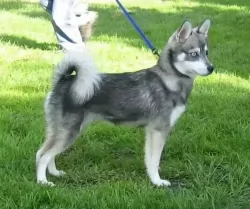 Your cuddly Mini Siberian Husky is such an intelligent dog, active and social and guaranteed to make you a splendid pet.
Your cuddly Mini Siberian Husky is such an intelligent dog, active and social and guaranteed to make you a splendid pet.
Being somewhat wary and aloof with strangers, they also make good watchdogs. They do well with children who have been taught to be kind and gentle with animals.
With good care your dog can reach up to 15 years of age, providing you with many years of superb friendship.
 The most notable aspect of the Irish Wolfhound is his amazing height. The legs are long, the body narrow. He is gentle and easy-going but because he is a sighthound he loves to give chase after animals.
The most notable aspect of the Irish Wolfhound is his amazing height. The legs are long, the body narrow. He is gentle and easy-going but because he is a sighthound he loves to give chase after animals.
He is capable of living in the city or countryside, but your home will need to cater to his size. He isn’t particularly energetic, enjoying a quiet life but he will absolutely need to be exercised.
Provide your gentle giant with everything needed to make him content, and you’ll have a faithful, loving friend for about 10 years.
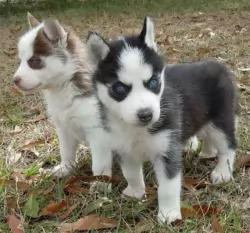 Your Miniature Siberian Husky is a healthy dog and you won’t have to spend too much money on him at the vet. However, just like with any other dog, he can battle with some of the common dog diseases -
Your Miniature Siberian Husky is a healthy dog and you won’t have to spend too much money on him at the vet. However, just like with any other dog, he can battle with some of the common dog diseases -
This eye problem affects about 10% of all Siberian Huskies and its not limited to old dogs. Juvenile cataracts can affect young dogs too. Luckily the problem isn’t painful for the dog.
Skin problems can be a concern for the Mini Siberian Husky, especially as one is used to seeing these dogs with thick coats. Follicular dysplasia is a genetic condition that causes patchy hair loss as well as a scaly, infected skin.
Check out that your dog is receiving nutritious food with vitamins and minerals as a zinc deficiency for instance can cause hair loss as well as skin problems.
 One wonders why breeders seem so bent on breeding such large dogs when they have health issues and they don't live particularly long. Not only do they cost a fortune to feed, but large dogs like this are more prone to illnesses and won’t live as long as small dog breeds. This big dog can live up to 10 years of age or so.
One wonders why breeders seem so bent on breeding such large dogs when they have health issues and they don't live particularly long. Not only do they cost a fortune to feed, but large dogs like this are more prone to illnesses and won’t live as long as small dog breeds. This big dog can live up to 10 years of age or so.
For starters, just because he is a deep chested dog, bloat or gastric torsion can be a threat. Other illnesses to look out for are dilated cardiomyopathy and bone cancer.
This is a disease of the heart muscle where the enlarged heart won’t function properly. The upper- and lower chambers of the heart are enlarged and the heart isn’t able to pump blood out properly. When the heart’s ventricle doesn’t pump enough blood into the lungs, fluid accumulates in the lungs and this ultimately leads to congestive heart failure.
Older dogs battle more with this heart disease and it is also more common in some dog breeds of which the Irish Wolfhound is one. Your dog will have shortness of breath, coughing and abdominal distension. He will need to get to the vet for medical tests.
Bone cancer can strike any dog, but you’ll find in more commonly with larger dog breeds. It can spread quickly and the long term prognosis isn’t good. It’s not easy to pick the disease up and it can mean joint pain for your pet and even lameness.
Your dog will be tired too. Your vet will do X-rays and other tests, but unfortunately the prognosis isn’t usually good. Big-dog breeders should take this into consideration.
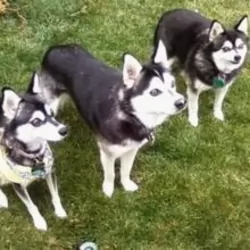 The Miniature Husky is an active and energetic breed that is going to require a lot of exercise. He is able to adapt to life in the city or the countryside but wherever you keep him as a pet, he will require regular daily exercise.
The Miniature Husky is an active and energetic breed that is going to require a lot of exercise. He is able to adapt to life in the city or the countryside but wherever you keep him as a pet, he will require regular daily exercise.
These dogs are used to cold climates so make sure your Mini Siberian Husky doesn’t overheat. Make sure that when he’s outdoors, there is shade for him and a water bowl. You’ll be doing him a real favor if you provide him with a small paddling pool to dip into on a hot day.
These are clean, odorless dogs that actually require little human help to be groomed. You can give your dog a good brush twice a week.
Mini Siberian Huskies, like the larger breed, have a high metabolism, so small amounts of highly nutritious food will do well with them. If you intend feeding your one commercially manufactured food, make sure its the high quality food that comes with plenty of minerals and vitamins. Try and avoid the low quality brands that come packed with unhealthy preservatives and colorants.
Dogs do well on simple, nutritious diets, so some boiled chicken, brown rice and raw and cooked vegetables such as carrots, potatoes and spinach added into the dry kibble from time to time will do him wonders.
Also try and include some raw meat into the kibble from time to time. That's it, as simple as that- no exotic, spicy foods and foods which we humans eat such as nuts, chips and chocolate – all can be toxic for your pet and just give him an upset stomach.
Make sure fresh, cool water is constantly available.
 This isn’t a particularly energetic dog and he can tend to become lazy. Don’t allow this as becoming unfit and overweight can be very bad for such large dog. Being so large already puts stress on the dog’s body, and the dog is already susceptible to cardiac and skeletal problems. Allowing him to become lazy and overweight will be a death sentence for this large dog. It is imperative to make sure you take him on walks and play games with him.
This isn’t a particularly energetic dog and he can tend to become lazy. Don’t allow this as becoming unfit and overweight can be very bad for such large dog. Being so large already puts stress on the dog’s body, and the dog is already susceptible to cardiac and skeletal problems. Allowing him to become lazy and overweight will be a death sentence for this large dog. It is imperative to make sure you take him on walks and play games with him.
The coat of your dog is thick and medium length and he will require being brushed at least twice a week. You may want to also trim the longer hair you find around his face and legs.
When it comes to his ears, you can moisten some cotton wool and wipe the inside of his ears to remove dirt and excess wax. Remember not to probe too deeply to avoid damaging the ear. If you’re uncertain how to do this, your vet can explain to you how its done.
Check his teeth regularly as dental disease can affect other areas of the body too. Don’t allow his nails to get too long as they can cause paw problems and the nails can hook onto things and cause injury.
Because this is a giant breed, the puppy will grow for a long time. Speak to your vet about how to ensure you feed your puppy in such a way that he doesn’t grow too quickly.
If you feed your dog a commercially manufactured food, make sure its one of the top quality brands. Include home-made cooked food such as chicken, rice and vegetables into his kibble from time to time, and also try to feed him some raw meat occasionally.
Fresh, cool water must be available to your Irish Wolfhound around the clock.